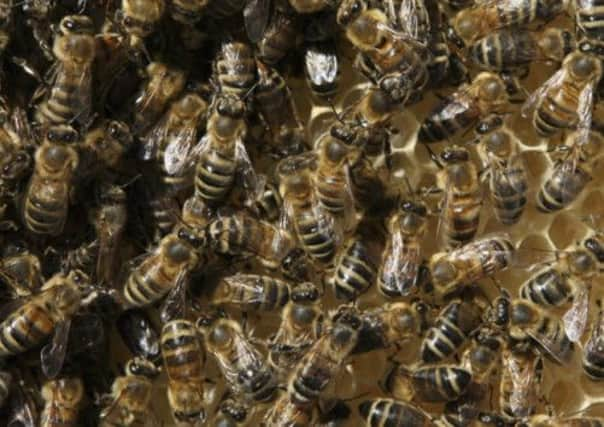‘Food prices to rise’ after honey bee deaths


Research by the University of Strathclyde found more than a third of managed honey bee colonies north of the Border died last winter – almost double the numbers lost the previous year.
Scientists warned the deaths could spark a hike in the cost of food by jeopardising the key natural “free service” bees provide in pollinating crops, threatened agricultural yields and “therefore food supply”.
Advertisement
Hide AdAdvertisement
Hide AdThe Scottish Beekeepers’ Association (SBA), which commissioned the study, blamed the latest “disconcerting” losses on last year’s washout summer. But study authors added that the use of pesticides was also a factor. Dr Alison Gray, co-author of the study, said: “This is an extremely high loss rate. In fact, the loss rate last winter is the highest we have found since these surveys began in 2006 – and is similar to that over the winter of 2009-10, when we estimate that 30.9 per cent of colonies were lost.
“Results from European colleagues conducting similar surveys show the loss rate in Scotland is among the highest in Europe this year, while similarly high losses have been reported from England and Wales.”
Warning that the losses should be “of major concern” due to the multi-million-pound benefits the natural behaviour of bees brings to the nation’s farming sector, she added: “Honey bees worldwide are having to contend with habitat loss and reduction in variety of forage sources due to pressures of intensifying land use, increasing spread of new and old pests – caused by globalisation of trade in bees and bee products – as well as possible adverse effects of agricultural pesticides. For bees in northern Europe, poor weather conditions – combined with these other factors – are certainly making beekeeping a challenge and survival difficult for honey bees generally.”
Experts also collected data from volunteers across Scotland on wild honey bees not managed by beekeepers. They found that 11 out of 20 colonies known to be alive last September have died out.
The study was based on responses to online and postal questionnaires from 300 members of the SBA, which represents most of the country’s estimated 1,300 beekeepers.
Phil McAnespie, SBA president, said: “It is disconcerting but understandable because the last two summers were so wet and bees can’t get out in those conditions, so colonies get smaller. With the good weather we have had this summer the bees are beginning to build up again, which should make a huge difference to next year’s colonies.”
Earlier this year, the Scottish Government announced a £200,000 fund to help commercial bee farmers restock and rebuild colonies devastated by extreme weather conditions.
The beekeepers taking part in the latest survey managed a total of 498 colonies, of which 156 colonies (31.3 per cent) were lost during the winter of 2012-13. The previous winter’s loss rate was 15.9 per cent.